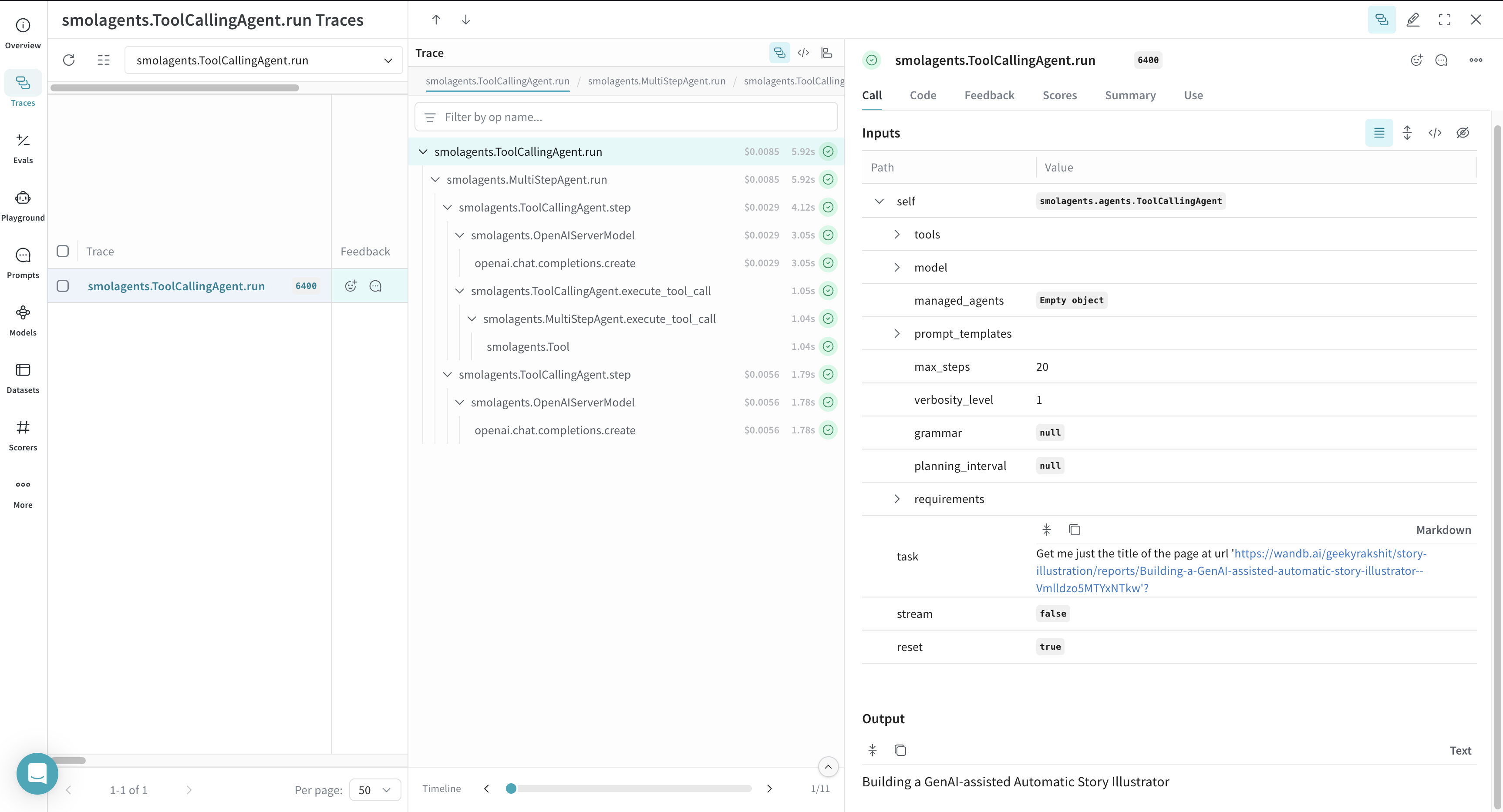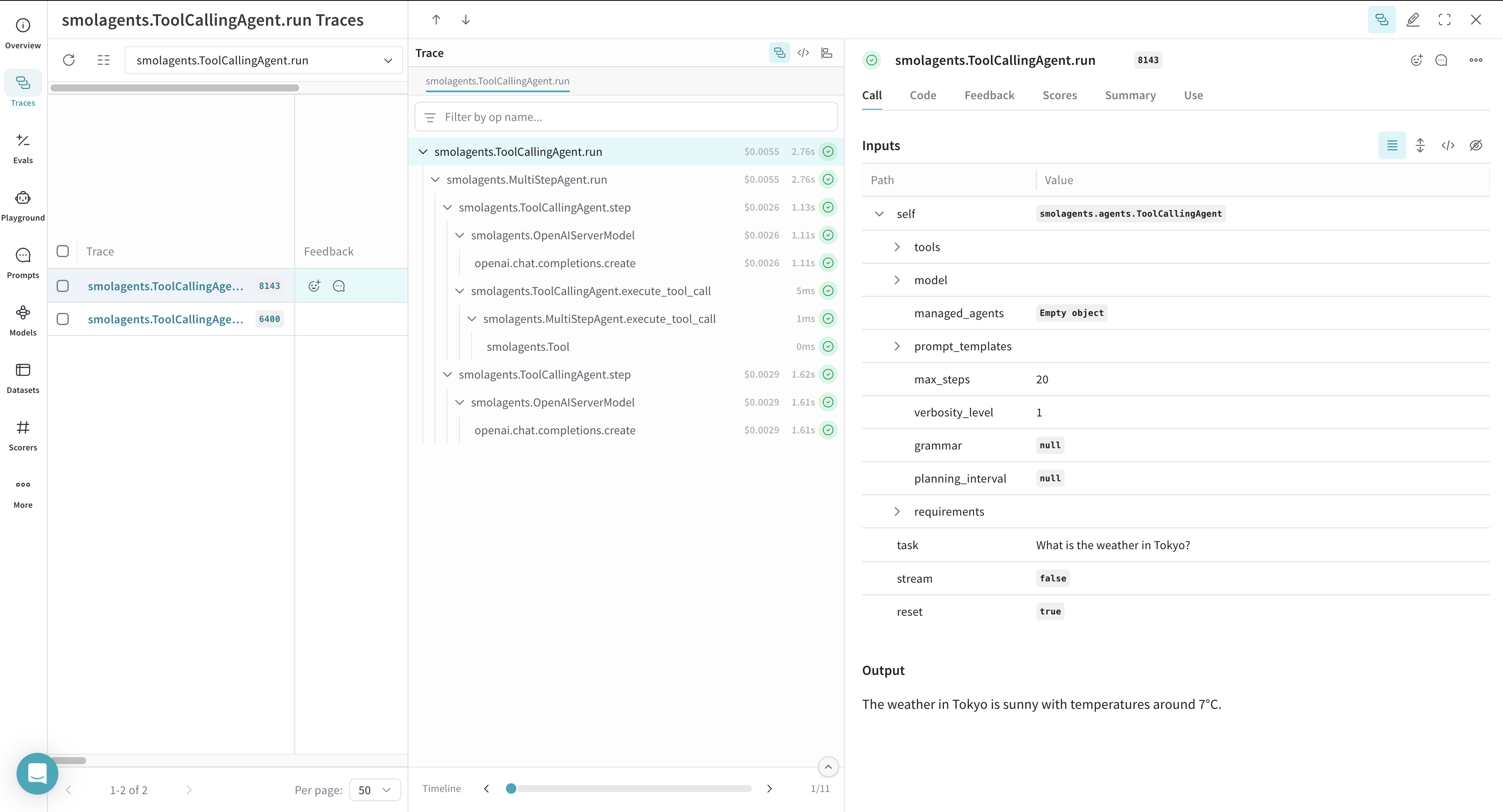Smolagents
All code samples shown on this page are in Python.
This page explains how to integrate Smolagents with W&B Weave to track and analyze your agentic applications. You'll learn how to log model inferences, monitor function calls, and organize experiments using Weave's tracing and versioning capabilities. By following the examples provided, you can capture valuable insights, debug your applications efficiently, and compare different model configurations—all within the Weave web interface.
Overview
Smolagents is a simple framework that offers minimal abstractions for building powerful agentic applications. It supports multiple LLM providers, such as OpenAI, Hugging Face Transformers, and Anthropic.
Weave automatically captures traces for Smolagents. To start tracking, call weave.init() and use the library as usual.
Prerequisites
-
Before you can use Smolagents with Weave, install the required libraries or upgrade to the latest versions. The following command installs or upgrades
smolagents,openai, andweave, and suppresses output:pip install -U smolagents openai weave -qqq -
Smolagents supports multiple LLM providers, such as OpenAI, Hugging Face Transformers, and Anthropic. Set the API key for your chosen provider by setting the corresponding environment variable:
import os
import getpass
os.environ["OPENAI_API_KEY"] = getpass.getpass("Enter your OpenAI API key: ")
Basic tracing
Storing traces of language model applications in a central location is essential during development and production. These traces help with debugging and serve as valuable datasets for improving your application.
Weave automatically captures traces for Smolagents. To start tracking, initialize Weave by calling weave.init(), then use the library as usual.
The following example demonstrates how to log inference calls to a tool-using LLM agent with Weave. In this scenario:
- You define a language model (OpenAI's
gpt-4o) using Smolagents'OpenAIServerModel. - You configure a search tool (
DuckDuckGoSearchTool) that the agent can invoke when needed. - You construct a
ToolCallingAgent, passing in the tool and model. - You run a query through the agent that triggers the search tool.
- Weave logs each function and model invocation, making them available for inspection via its web interface.
import weave
from smolagents import DuckDuckGoSearchTool, OpenAIServerModel, ToolCallingAgent
# Initialize Weave
weave.init(project_name="smolagents")
# Define your LLM provider supported by Smolagents
model = OpenAIServerModel(model_id="gpt-4o")
# Define a DuckDuckGo web search tool based on your query
search_tool = DuckDuckGoSearchTool()
# Define a tool-calling agent
agent = ToolCallingAgent(tools=[search_tool], model=model)
answer = agent.run(
"Get me just the title of the page at url 'https://wandb.ai/geekyrakshit/story-illustration/reports/Building-a-GenAI-assisted-automatic-story-illustrator--Vmlldzo5MTYxNTkw'?"
)
Once you run the code sample, navigate to your Weave project dashboard to view the traces.

Tracing custom tools
You can declare custom tools for your agentic workflows by decorating a function with @tool from smolagents or by inheriting from the smolagents.Tool class.
Weave automatically tracks custom tool calls for your Smolagents workflows. The following example shows how to log a custom Smolagents tool call with Weave:
- A custom
get_weatherfunction is defined and decorated with@toolfrom Smolagents, enabling the agent to invoke it as part of its reasoning process. - The function accepts a location and an optional flag for Celsius output.
- A language model is instantiated using
OpenAIServerModel. - A
ToolCallingAgentis created with the custom tool and model. - When the agent runs the query, it selects and invokes the
get_weathertool. - Weave logs both the model inference and the custom tool invocation, including arguments and return values.
from typing import Optional
import weave
from smolagents import OpenAIServerModel, ToolCallingAgent, tool
weave.init(project_name="smolagents")
@tool
def get_weather(location: str, celsius: Optional[bool] = False) -> str:
"""
Get the weather in the next few days for a given location.
Args:
location: The location.
celsius: Whether to use Celsius for temperature.
"""
return f"The weather in {location} is sunny with temperatures around 7°C."
model = OpenAIServerModel(model_id="gpt-4o")
agent = ToolCallingAgent(tools=[get_weather], model=model)
answer = agent.run("What is the weather in Tokyo?")
Once you run the code sample, navigate to your Weave project dashboard to view the traces.
